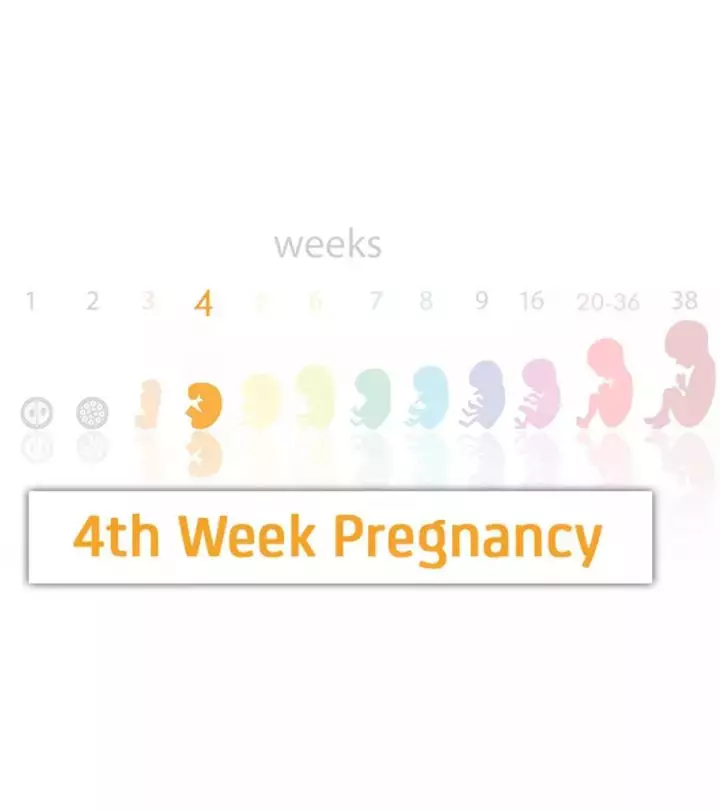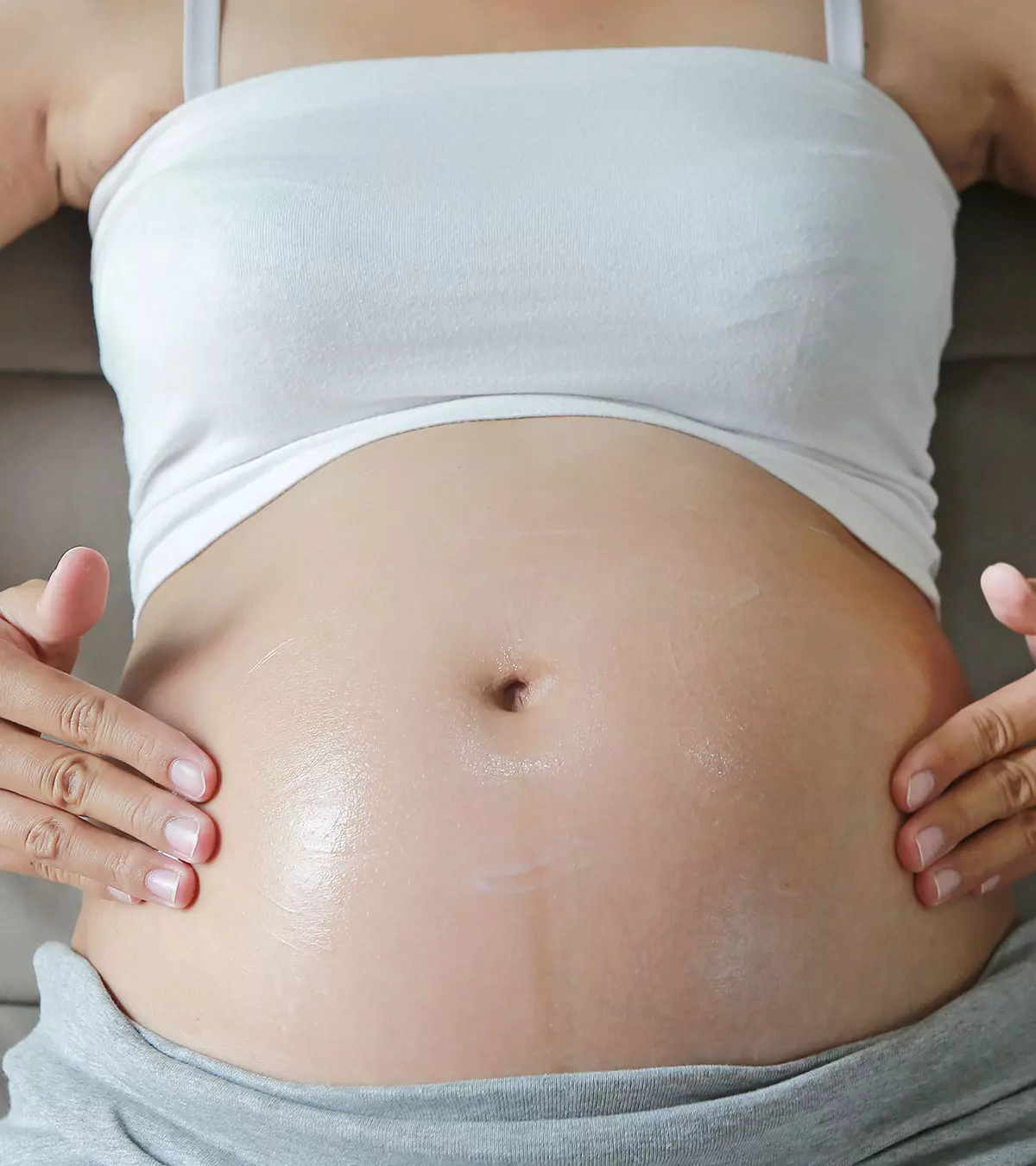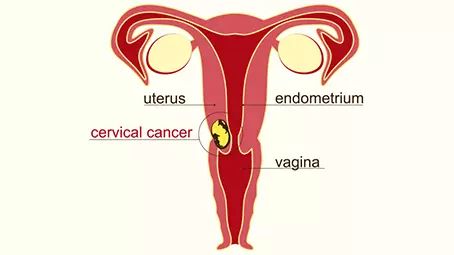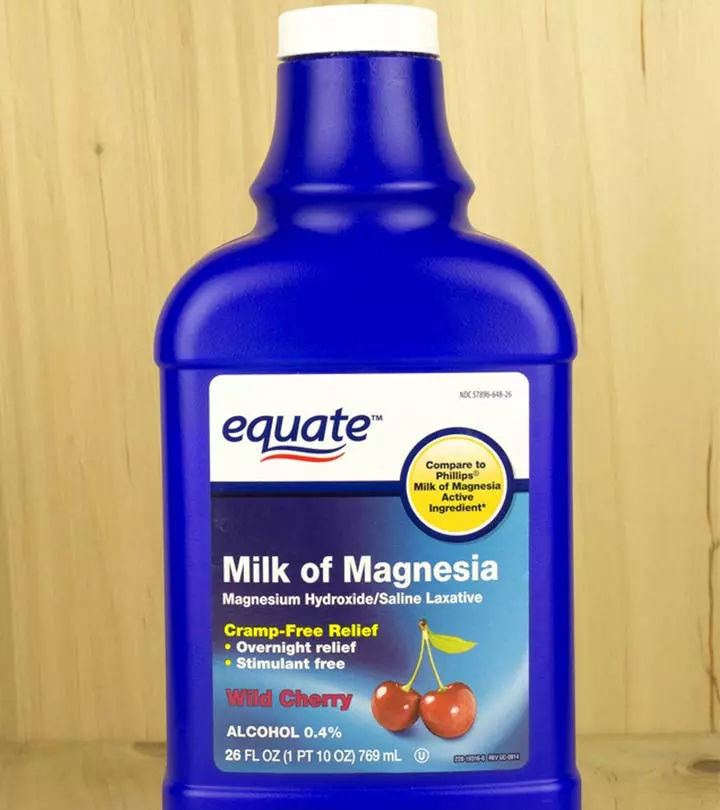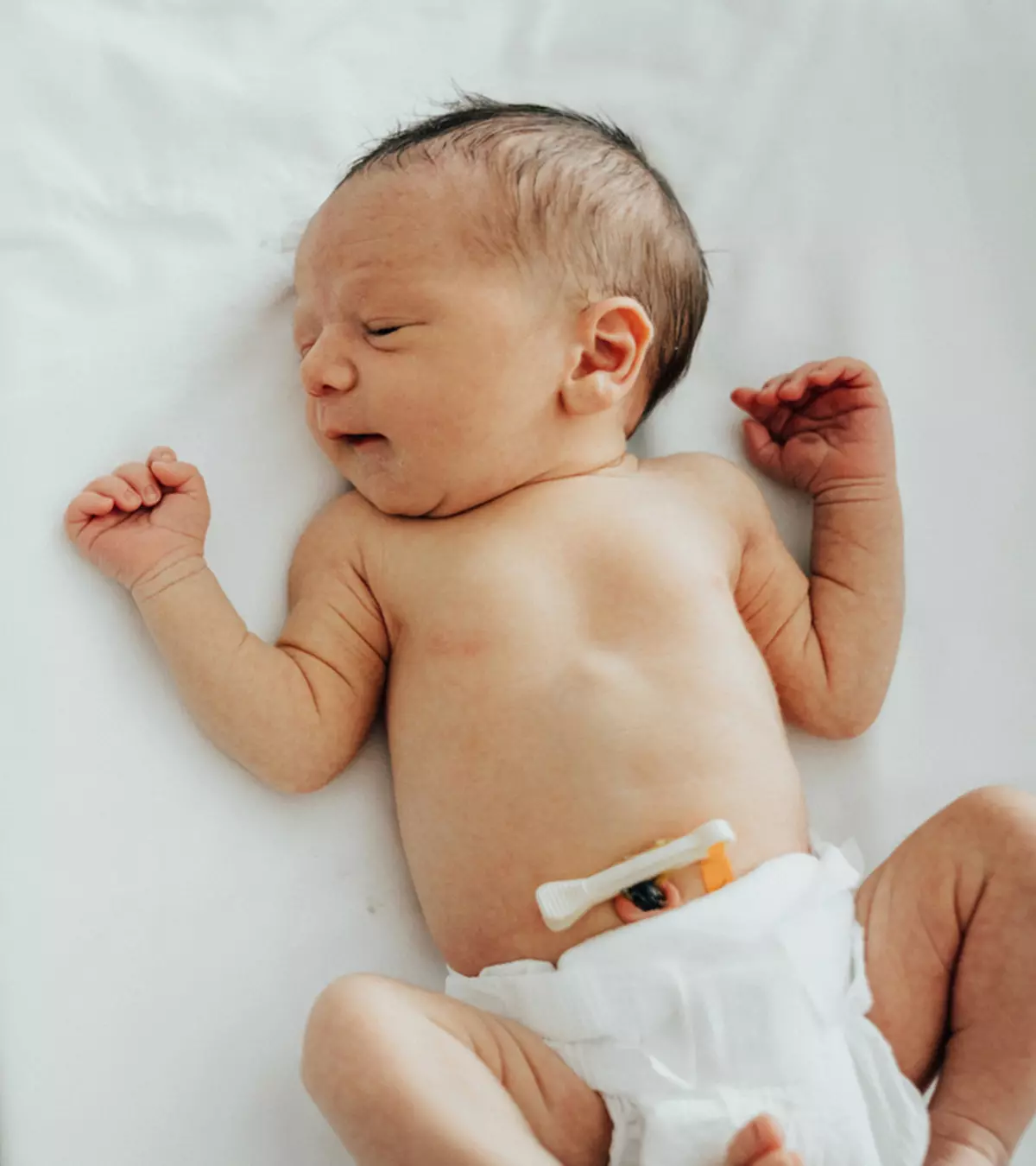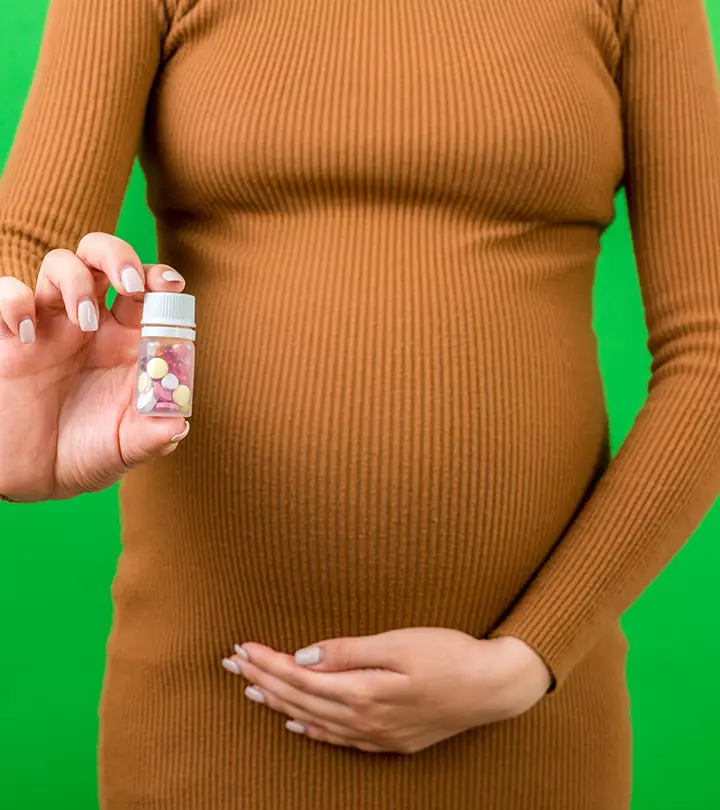
Image: iStock
Every year approximately 10 to 15% of reproductive-aged women in the US are prescribed antidepressants. The doctor may prescribe pregnancy-safe antidepressants based on the individual’s treatment history, past medications, pregnancy condition, the severity of depression, mental health, and the most up-to-date information on reproductive safety. Untreated depression may contribute to adverse pregnancy outcomes, affecting maternal health and leading to complications (1).
This post discusses the safe use of antidepressants during pregnancy and the risks associated with them.
Key Pointers
- Maternal depression during pregnancy increases risks of adverse effects for mother and fetus.
- Selective serotonin reuptake inhibitors (SSRIs) are generally safe during pregnancy, except for paroxetine.
- Sertraline is the most prescribed antidepressant for pregnant women with depression.
- Antidepressant exposure in late third trimester may cause neonatal complications, leading to prolonged hospitalization, respiratory support, and tube feeding.
Why Is Treatment Of Depression During Pregnancy Important?

Image: Shutterstock
Maternal depression is a major risk factor for several side effects in both the mother and fetus. About one in ten pregnant women experience symptoms of depression during pregnancy, as per the World Health Organization. In developed countries, depression during pregnancy may be seen in 15.6% of all pregnant women. Depression and anxiety during pregnancy are associated with:
- Increased risks of preeclampsia, fetal distress, preterm labor and birth, low birth weight, and postpartum depression.
- Unhealthy maternal behavior such as maternal tobacco smoking, excess caffeine consumption, poor nutrition, and inadequate exercise.
- Cognitive and behavioral problems of the child with growth.
Effective treatment can decrease these risks. Abruptly stopping antidepressant treatment in pregnancy in women with a previous history of depression may cause a relapse of symptoms in approximately 60-70% of women. Additionally, perinatal depression may also increase the risk of maternal mortality rates due to suicide (2) (3).
 Quick fact
Quick factAre Antidepressants Safe During Pregnancy?
Studies suggest that antidepressants of the class, selective serotonin reuptake inhibitors (SSRIs), have not been found to cause major malformations with the exception of paroxetine, sold as Paxil. Some other antidepressants, such as selective norepinephrine reuptake inhibitors (SNRIs), Monoamine oxidase inhibitors (MAOIs), and dopamine reuptake inhibitors, may also be used.
Some antidepressant medications have been associated with congenital malformations. Therefore, discuss the risks and benefits of antidepressants extensively with a psychiatric consultant. It can help you identify a safe and effective option during pregnancy (4) (5).
 Experts say
Experts sayWhich Antidepressants Are Commonly Prescribed During Pregnancy?

Image: Shutterstock
Sertraline (an SSRI) did not show confirmed links with birth defects in a study conducted by the Centers for Disease Control and Prevention (CDC). Sertraline (Zoloft) is prescribed most often to pregnant women with depression (6). Other antidepressants prescribed during pregnancy may include (7):
- Citalopram (Celexa)
- Escitalopram (Lexapro)
- Fluoxetine (Prozac)
- Bupropion (Wellbutrin)
The above-mentioned drugs are enlisted in pregnancy category C (Animal reproduction studies have shown potential adverse effects on the fetus, and there are no adequate and well-controlled studies in humans, but potential benefits may warrant use of a drug in pregnant women despite potential risks) as per the US Food and Drug Administration (FDA) (8).
 Point to consider
Point to considerCan Antidepressants Cause Miscarriage?
Some studies have shown an increased risk of spontaneous abortions (miscarriages) with antidepressant exposure in early pregnancy. However, these studies did not include the contribution of the underlying psychiatric illness and other factors such as poor nutrition, smoking, and substance abuse (9).
What Are The Other Potential Risks Of Using Antidepressants During Pregnancy?

Image: Shutterstock
Doctors need to balance the potential risks of medications with that of the untreated disorder during pregnancy. Antidepressant exposure late in the third trimester of pregnancy may affect neonatal health and cause complications requiring prolonged hospitalization, respiratory support, and tube feeding. Potential risks of prenatal exposure to antidepressants include (6) (8):
1. Fluoxetine has been linked to

Image: Shutterstock
- Cardiac malformation (heart defect) with obstructed right ventricular outflow tract
- Craniosynostosis (a birth defect in which the bones in a baby’s skull join together too early)
2. Paroxetine may be associated with
- Anencephaly (baby is born without parts of the brain and skull)
- Atrial septal defects (a type of heart defect)
- Heart defects with obstructed right ventricular outflow tract
- Gastroschisis (structural anomaly of the abdominal wall)
- Omphalocele (a birth defect of the abdominal wall)
3. Other conditions linked to SSRIs are
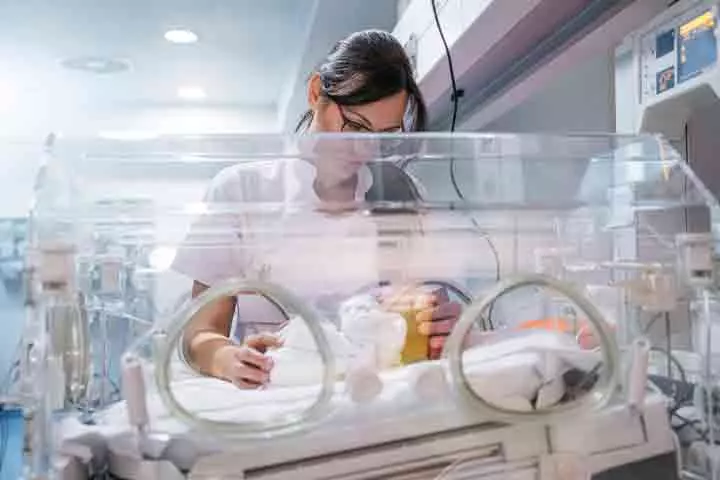
Image: Shutterstock
- Persistent pulmonary hypertension (PPHN) in the newborn (failure of the lungs to breathe outside the womb), may increase neonatal mortality risk.
- Neonatal withdrawal syndrome may show symptoms such as seizures, temperature instability, feeding difficulty, gastrointestinal problems, tremors, increased or decreased muscle tone, jitteriness, irritability, mood disorders, and constant crying. These conditions may also be caused by SNRIs.
- Antidepressant exposure late in the third trimester may cause neonatal complications requiring prolonged hospitalization, respiratory support, and tube feeding.
Frequently Asked Questions
1. Which class of antidepressant drugs is most commonly used during pregnancy?
Selective Serotonin Reuptake Inhibitors (SSRIs) are the most commonly prescribed class of antidepressants during pregnancy (9).
2. What is the safest antidepressant during pregnancy?
Although SSRIs are the first option for antidepressants during pregnancy, SSRIs and tricyclic antidepressants (TCA) can be considered safe for pregnant women (10).
3. Can antidepressants during pregnancy cause autism?
Yes, consumption of antidepressants during pregnancy may be related to autism in the offspring. According to studies, SSRI increases the level of serotonin, responsible for neurotransmission, which then interferes with the function and structure of the fetal brain and may also cause developmental delays (11) (12).
Depression during pregnancy may be treated effectively by combining medication therapy with counseling. Extensive research is required to understand the fetal risks and benefits of each antidepressant drug. Nevertheless, you should consult your doctor for treatment decisions regarding antidepressants. Do not abruptly stop taking or switch medications. Inform your psychiatrist or healthcare provider if you are pregnant or planning pregnancy. Make sure to follow up on all referrals and treatment and psychotherapy sessions that your doctor suggests (13).
Infographic: Potential Risks Of Depression During Pregnancy
Untreated depression may have untoward effects on the mother and the growing fetus. Although some antidepressants may have side effects, the risk-benefit ratio decides the treatment module during pregnancy. The infographic below highlights the risks associated with untreated depression in expectant mothers.
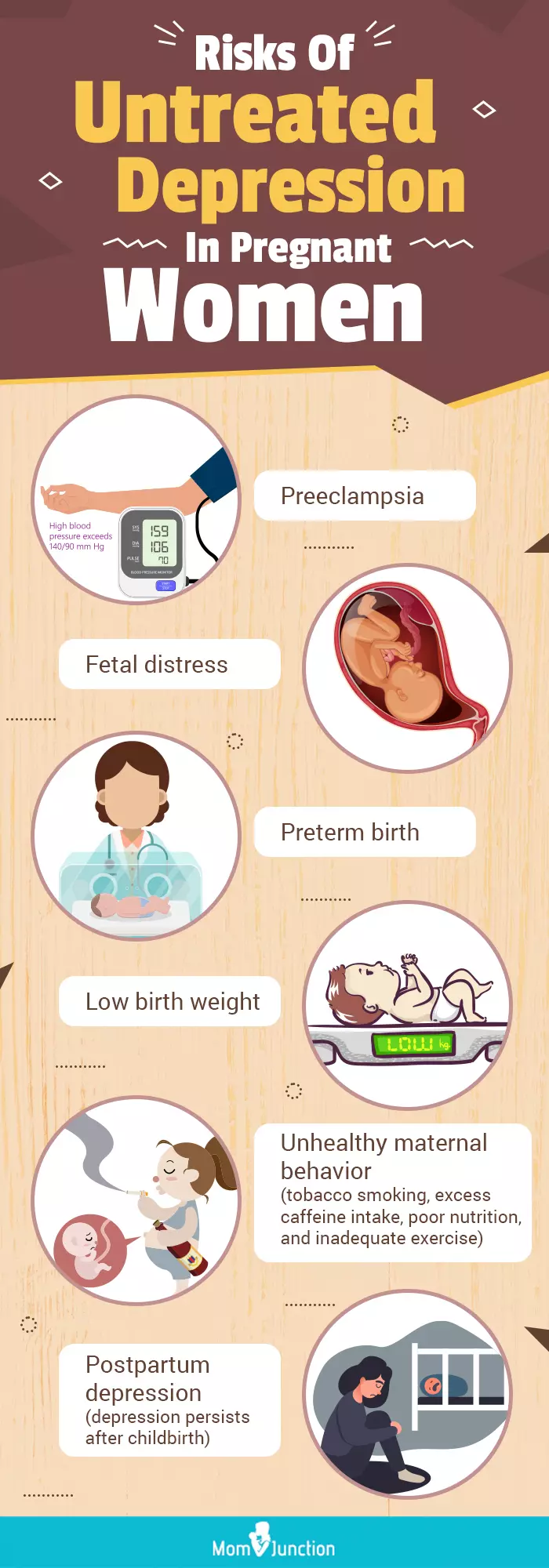
Illustration: Momjunction Design Team
Illustration: Is It Safe To Take Antidepressants During Pregnancy?

Image: Stable Diffusion/MomJunction Design Team
Antidepressants must not be taken during pregnancy without a prescription. Watch this video to learn more about antidepressant safety during pregnancy.
References
- Kayla N. Anderson et al.; (2020); Maternal Use of Specific Antidepressant Medications During Early Pregnancy and the Risk of Selected Birth Defects.
https://jamanetwork.com/journals/jamapsychiatry/fullarticle/2769190 - Nancy Byatt et al.; (2014); Antidepressant Use in Pregnancy: A Critical Review Focused on Risks and Controversies.
https://www.ncbi.nlm.nih.gov/pmc/articles/PMC4006272/ - Jennifer L. Payne et al.; (2009); Antidepressant Use During Pregnancy: Current Controversies and Treatment Strategies.
https://www.ncbi.nlm.nih.gov/pmc/articles/PMC2749677/ - Anxiety and Pregnancy.
https://www.acog.org/womens-health/faqs/anxiety-and-pregnancy - Safety Check: Pregnancy and Antidepressant Drugs.
https://www.urmc.rochester.edu/news/publications/health-matters/safety-check-pregnancy-and-antidepressant-drugs - Key Findings—A Closer Look at the Link Between Specific SSRIs and Birth Defects
https://www.ncbi.nlm.nih.gov/pmc/articles/PMC8346399/ - Antidepressants and pregnancy: More research needed.
https://www.health.harvard.edu/blog/antidepressants-and-pregnancy-201605199641 - Appendix AFDA Antidepressant Drug Labels for Pregnant and Postpartum Women.
https://www.ncbi.nlm.nih.gov/books/NBK349032/ - Nisha D. Almeida et al.; (2016); Risk of Miscarriage in Women Receiving Antidepressants in Early Pregnancy Correcting for Induced Abortions
https://www.jstor.org/stable/26511768#:~:text=Conclusions%3A%20antidepressant%20use%20in%20theafter%20accounting%20for%20induced%20abortions. - Yen-HaoTran et al. (2022); Antidepressant use during pregnancy and development of preeclampsia: A focus on classes of action and specific transporters/receptors targeted by antidepressants.
https://www.sciencedirect.com/science/article/pii/S002239562100741X - JANE HUNTINGTON AND VERONIKA ZANTOP; (2004); Antidepressant Medications in Pregnancy.
https://www.aafp.org/pubs/afp/issues/2004/1201/p2195.html - Ori Kapra et al. (2020); The Association Between Prenatal Exposure to Antidepressants and Autism: Some Research and Public Health Aspects.
https://www.frontiersin.org/journals/psychiatry/articles/10.3389/fpsyt.2020.555740/full - Dheeraj Rai et al. (2017); Antidepressants during pregnancy and autism in offspring: population based cohort study.
https://www.bmj.com/content/358/bmj.j2811 - Depression during pregnancy: You’re not alone.
https://www.mayoclinic.org/healthy-lifestyle/pregnancy-week-by-week/in-depth/depression-during-pregnancy/art-20237875 - Lars Henning Pedersen et al.; (2009); Selective serotonin reuptake inhibitors in pregnancy and congenital malformations: population based cohort study
https://www.ncbi.nlm.nih.gov/pmc/articles/PMC2749925/ - Key Findings—A Closer Look at the Link Between Specific SSRIs and Birth Defects.
https://www.ncbi.nlm.nih.gov/pmc/articles/PMC6096863/ - Michal Dubovicky et al.; Risks of using SSRI / SNRI antidepressants during pregnancy and lactation;
https://www.ncbi.nlm.nih.gov/pmc/articles/PMC6096863/
Community Experiences
Join the conversation and become a part of our nurturing community! Share your stories, experiences, and insights to connect with fellow parents.
Read full bio of Dr. Kritika Shashank Verma
Read full bio of Dr. Joyani Das
Read full bio of Rebecca Malachi
Read full bio of Reshmi Das













